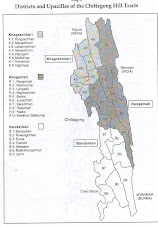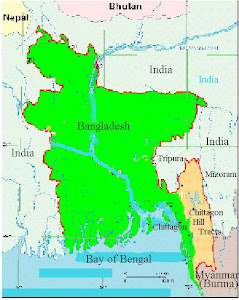chtnews.com
News No. 21/2008, February 08, 2008
Reports reaching from Naniachari in Rangamati district said the illegal settlers began planting paddy saplings on land forcibly grabbed from some Jumma individuals in Hatimara village under Burighat Union today, while army personnel stood guard nearby.
Army personnel were also posted at Krishnamachara Primary school near the land where the settlers were working so that the Jummas could not lodge any effective protests.
A Jumma government official from Naniachar told chtnews.com that Md. Abul Sharif, an illegal settler from Bogachari, was planting paddy saplings on 1.6 acres of land grabbed from Sunil Kumar Chakma (36) under military protection.
Tensions have been building up since December last year when the settlers from Burighat forcibly took away at least 25 acres of land, of which 10 acres are "fringe land".
Acting on complaint from the Jumma land owners, on 3 January the Naniachari Upazila Nirbahi (Executive) Officer Mr. Humayoon Kabir Sirkar visited the spot under army protection and instead of ejecting the illegal land grabbers advised the Jummas to share their lands with the settlers.
The Jummas rejected the TNO's decision terming it unjust and biased in favour of the settlers and on 26 January raised the issue with the Chakma circle chief Raja Barrister Debasish Roy, who has been appointed as Special Assistant to the Chief Adviser in charge of Chittagong Hill Tracts Ministry.
Drama of disappearance
On 20 January, a settler named Shamshu Mollah, who is mentally abnormal and debt-ridden, was rumoured to have been disappeared. Using this as a pretext, the settlers mounted attacks on the innocent Jummas.
They beat up four Jummas who came to East Hatimara from Gorjontoli to buy pineapple saplings.
Two other Jummas from East Hatimara village - Shubho Dhan Dewan, aged 24, s/o Nalini Dewan and Ananda Chakma, aged 24, s/o Karunamoy Karbari - also fell victim. Both of them were roughed up. One of them sustained injuries in one eye and the other got his leg fractured.
More attacks were feared and the innocent Jummas from North and East Hatimara villages began leaving their homes.
By 23 January, the two villages became desolate. 45 families (300 persons) from East Hatimara and 36 families (250 persons) from North Hatimara took shelter in the nearby villages of Bhangamura, Chelozchari and Pudial.
On 29 January, a representative of the Chakma Raja Debasish Roy visited the area to enquire about the situation. This was followed by two visits by Naniachar zone commander and an official of local civil administration.
The civil administration requested the villagers to return to their homes. But they refused to do so without full guarantee for their lives and property. Later, the civil administration officials and local public representatives talked to them and assured them that there would be no further settler attack on them. They returned to their homes between 30 January and 3 February.
Both the civil and military administration showed complete apathy towards the sufferings of the distraught Jummas, who had to live without adequate food and warm cloths in freezing cold. There were none to look after those who fell sick. No one came up to help them. The civil administration's step-motherly behaviour was breathtaking in its palpability. Not to speak of the army.
When Mr. Pranati Khisha, chairman of Burighat Union Council, showed his interest to take actions to mitigate the sufferings of the ill fated Jummas, the settlers from Burighat bazaar harassed him while the army tried to detain him. However, two kind-hearted Bengali settlers came to his rescue and helped him to run away (the name of the settlers withheld for security concern).
skip to main |
skip to sidebar


Map of Bangladesh

CHTs is number one Milliary zone in the world


Ministry of Chittagong Hill Tracts Affairs
The United Nation
The IJPMNA
This page provides information of the minority Indigenous Jumma Peoples in Chittagong Hill Tracts (CHTs) Bangladesh.
Contact with this please write:-ijpnusa@yahoo.com
Contact with this please write:-ijpnusa@yahoo.com
About Us
Location of Jummaland

Jumma Videos
- The BANDARBAN SADAR
- The Rowangchari
- The Ruma
- The Lama
- The Thanchi
- The Alikadom
- The Naikhkhongchari
- The RANGAMATI SADAR
- The Baghaichari
- The Langudu
- The Nanyachar
- The Barkal
- The Jurachari
- The Bilaichari
- The Kaptai
- The Rajsthali
- The Kawkhali
- The KHAGRACHARI SADAR
- The Manikchari
- The Laksmichari
- The Mahalchari
- The Matiranga
- The Ramgarh
- The Dighinala
- The Panchari
Audio & Video
Jumma Natok (Drama)
International Support
Educational Institution
Religious Organization
Buddhist Studies

Map of Bangladesh
Mission of Bangladesh
About Bangladesh
Bangali Audio Songs
Bengali News

CHTs is number one Milliary zone in the world
Online Audios
Refugee in Homeland

Jumma Picture

Blog Archive
About Me
- The Indigenous Jumma Peoples Movement in North America
- The Chittagong Hill Tracts (CHT) region comprises three districts: Banderban , Khagrachari and Rangamati. The districts comprise seven main valleys formed by the Feni, Karnafuli, Chengi, Myani, Kassalong, Sangu and Matamuhuri rivers aid their tributaries and numerous hills, ravines and cliffs covered with dense vegetation, which are in complete contrast to most other districts of Bangladesh, which consist mainly of alluvial lands. Geographically the CHT can be divided into two broad ecological zones: (a) hill valley, (b) agricultural plains. It is surrounded by the Indian states of Tripura on the north and Mizoram on the east, Myanmar on the south and east and Chittagong district on the west.
